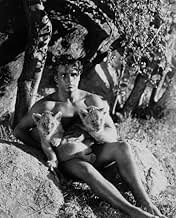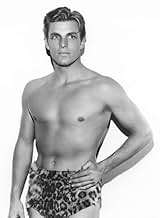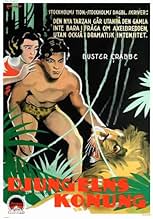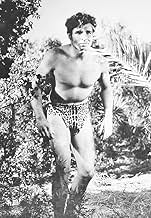IMDb-BEWERTUNG
6,2/10
257
IHRE BEWERTUNG
Füge eine Handlung in deiner Sprache hinzuA white youth who is raised in the jungle by the animals is captured by a safari and brought back to civilization as an attraction in a circus.A white youth who is raised in the jungle by the animals is captured by a safari and brought back to civilization as an attraction in a circus.A white youth who is raised in the jungle by the animals is captured by a safari and brought back to civilization as an attraction in a circus.
Douglass Dumbrille
- Ed Peters
- (as Douglas Dumbrille)
Ronnie Cosby
- Kaspa at age three
- (as Ronnie Cosbey)
Robert Adair
- John C. Knolls
- (Nicht genannt)
Florence Britton
- Mrs. Edith Knolls
- (Nicht genannt)
Don Brodie
- Reporter
- (Nicht genannt)
Leonard Carey
- Clerk at Hunting License Bureau
- (Nicht genannt)
Nora Cecil
- Spinster in Park
- (Nicht genannt)
Empfohlene Bewertungen
Paramount's answer to Tarzan, with Olympic athlete Buster Crabbe as a child raised to adulthood by a pride of lions. The expected complications result when Buster and his furry pals are transported to a circus. Charmingly clumsy in its early scenes, the film builds to an exciting, fiery conclusion. Animal activists will wince at a brutal battle between some big cats, but otherwise it's very entertaining.
This 1933 pre-code antique is a delight on several levels. For once, it's a jungle movie from the early thirties when MGM's Johnny Weismuller was bringing in the money as that studio's Tarzan. So, Paramount wanted some of the jungle action and created this very enjoyable variation of the wild boy raised in the jungle by wild animals.
I've always felt Buster Crabbe was terribly under-rated. Here he is in all his near naked glory as Kaspa, the Lion King. We're never really explained as to how he escaped a wrecked plane and managed to grow up into this radiant Adonis but since this movie was made before the production code, we get to see lots of Buster since he wears a bikini sling-shot so abbreviated that he really is virtually naked, except for his rear-end. In fact, the movie's ads were aimed primarily at the women audience members at their chance to see a beautiful Adonis in the near altogether as this jungle god.
The cast is surprisingly strong with excellent production values, camera work and editing. The best part of the movie by far is the huge circus fire at the end. Not sure how they did this but the fleeing circus patrons look genuinely terrified and Buster is in his glory as he breaks through the police lines to rescue his beloved cats.
There is naturally a love story to all this and Francis Dee makes a delightful choice as a school teacher who see's the real potential of this jungle boy when he invades her apartment. She takes him under her wing and travels with the circus to support and educate him.
This was Buster's first movie, fresh from winning major swimming olympic awards and his natural beauty is spell-bounding. His torso is beautifully proportioned, he sports a thick head of dark curls and his face is as innocent and boyish as one would expect of a young male suddenly thrust from the jungle into the wilds of a big city.
This quality of wide-eyed innocence is what new audiences are discovering about Buster Crabbe as they watch him in "Flash Gordon", his various serials and especially another jungle yarn, "Tarzan the Fearless" in which he reprises his identical bikini slingshot and makes a very appealing young Tarzan.
No, this is not a Tarzan film; the name of the hero here is Kaspa (and it is not a ghost movie, either). Kaspa was raised by lions and trapped by white bwanas to be taken back to New York (like King Kong). Some of the scenes are quite remarkable; especially ones with the young child Kaspa in the beginning of the film. However, the film could not possibly have the disclaimer that no animals were hurt or killed in the filming of this movie. Other than that unpleasant caveat, the film is immensely entertaining and good fun for the whole family.
A British man, his wife, and their small boy go into the jungle. The adults are killed, but the boy is succored by lions to grow up to be Buster Crabbe. Discovered by men hunting for animals for the circus, he is captured and sold to Sidney Toler, who calls him Kaspa the Griendly Ghost.... I mean the Lion Man. When the ship pulls into San Fracisco, Crabbe escapes, but finds a refuge at the home of schoolteacher Frances Dee and her sister, Nydia Westman. Toler takes Miss Dee along, since Crabbe likes her, and she gradually teaches him English and falls in love with him.
H. Bruce Humberstone directs Paramount's answer to TARZAN THE APE MAN, and while the story is very different, the characters fall into the same roles as in Burroughs' story. There are some nice circus bits, and of course, a big fire, with the elephants escaping into town. It's certainly not particularly brilliant, but it is the sort of solid, entertaining story that the majors could turn out in the period. With Robert Barratt, Irving Pichel, and Douglas Dumbrille.
H. Bruce Humberstone directs Paramount's answer to TARZAN THE APE MAN, and while the story is very different, the characters fall into the same roles as in Burroughs' story. There are some nice circus bits, and of course, a big fire, with the elephants escaping into town. It's certainly not particularly brilliant, but it is the sort of solid, entertaining story that the majors could turn out in the period. With Robert Barratt, Irving Pichel, and Douglas Dumbrille.
KING OF THE JUNGLE (Paramount, 1933), directed by H. Bruce Humberstone, from Charles T. Stoneham's novel, "The Lion's Way," is an adventure story that capitalizes on the current success of TARZAN, THE APE MAN (MGM, 1932), that starred Olympic swimming champion Johnny Weissmuller. While it's quite evident for rival studios to come up with imitations of their own, this appears to have been the only one made during the height of all those "Tarzan" adventures and the long series of popular sequels and carbon copies. Paramount acquired its own Olympic swimming champion in the physique of Larry "Buster" Crabbe, much taller and broader shoulders than Weissmuller, in a Tarzan-like imitation as Kaspa, the Lion Man, but unlike "Tarzan," this one didn't develop into a "Kaspa" series in spite of it's somewhat left open conclusion.
The story opens in the jungles of Africa where coming down a hill is a little boy (Ronnie Cosbey) in safari clothes roaming about by himself. He encounters little lion cubs, starts playing with them until the mother lion approaches. She carries the boy away, but eventually allows the youngster to continue to play with her cubs. This epilogue fades some twenty years showing the development of this little straight haired blond boy into a grown-up curly darker-haired jungle man sporting a leopard skin loincloth, roaming about the jungle helping his lion friends. Enter the white hunters who encounter this half-naked native who only communicates in grunts and groans. He's captured and caged up labeled as "what is it?" in a cargo ship bound for America along with the lions, where he is to be sold off as a circus attraction. However, close to port, Kaspa escapes his captivity, swims towards the city where he is soon noticed by spinster passersby taking a stroll through the park one day. They notify the police that they have spotted a naked man in the area. Pursued by the police, Kaspa enters into an open window to the apartment of Anne Rogers (Frances Dee), a schoolteacher, and her roommate, Sue (Nydia Westman). After offering him some food and seeing he could be tamed, especially since he's captivated by her beauty, Anne, after encountering Kaspa's captures, agrees to assume her new position in educating and civilizing the jungle man while becoming part of a lion act at the circus. In spite of his fame and fortune, Kaspa finds he's not happy with his new life and wants to return to Africa, taking the lions with him, but is faced with certain situations holding him back.
In watching KING OF THE JUNGLE, one cannot help but compare this to the Edgar Rice Burroughs character. Unlike the "Tarzan" adventures, KING OF THE JUNGLE takes a different turn in not being set entirely in the jungle. It does consist of some wildlife scenes in the beginning, but nothing memorable nor climatic as those frequent crocodiles fights or native uprising in the Tarzan tradition. During its second half which finds Kaspa in civilization, he is taught to read, write and speak in an articulate manner by his teacher girlfriend (not like the MGM series where Tarzan speaks only in mono syllables), as well as abandon his jungle attire while off duty from the circus to go seen fully clothed, predating Weissmuller's trip to the Big Apple by nine years in TARZAN'S NEW YORK ADVENTURE (1942) which has Tarzan in Stone Jungle wearing fashionable suits. However, much of the true action in KING OF THE JUNGLE takes place in the circus portion highlighted by a fire blaze where Kaspa risks his life to save his caged animal friends, especially the lions.
Although a good story, there's really no explanation to Kaspa's origins, who his people are, and why and how he, as a little boy of 3, ended up in the jungle of cubs in the first place. Could it be that there was an airplane crash, for instance, by which the youngster became the lone survivor? How did he acquire the name of Kaspa? Did scenes such as the aforementioned wind up on the cutting room floor before its theatrical release?
Aside from Frances Dee as Kaspa's newfound mate, Sidney Toler as the circus owner, Irving Pichel and Douglass Dumbrille add fine support, along with Warner Richmond Barrat as the drunken circus worker responsible for the fire, and Patricia Farley as a circus employee/ flirt who has her her eyes on Kaspa, only to be told by the educated jungle man in his new English vocabulary to "Scram!" as she tries to get his attention.
In the mid 1970s, aside from seeing this movie occasionally on commercial TV, I recall watching "Buster" Crabbe as guest on the long running "Joe Franklin Show," based in New York City on WOR, Channel 9, where he recalled KING OF THE JUNGLE to be the only "A" movie he ever made. Although Crabbe did lose out in playing Tarzan to Weissmuller a year before, he did enact the part in an independent chaptered serial and re-edited feature of TARZAN THE FEARLESS (1933). Much to the delight of Weissmuller fans, Crabbe never played the legendary jungle hero again. Two Tarzans, too many. However, Crabbe did leave a mark in cinema history playing "Flash Gordon" and "Buck Rogers" for Universal's weekly serial department.
Out of circulation since it's frequent showings on American Movie Classics in 1989, KING OF THE JUNGLE, which runs at 70 minutes, is currently available on video by logging onto TVIDEO.com (***)
The story opens in the jungles of Africa where coming down a hill is a little boy (Ronnie Cosbey) in safari clothes roaming about by himself. He encounters little lion cubs, starts playing with them until the mother lion approaches. She carries the boy away, but eventually allows the youngster to continue to play with her cubs. This epilogue fades some twenty years showing the development of this little straight haired blond boy into a grown-up curly darker-haired jungle man sporting a leopard skin loincloth, roaming about the jungle helping his lion friends. Enter the white hunters who encounter this half-naked native who only communicates in grunts and groans. He's captured and caged up labeled as "what is it?" in a cargo ship bound for America along with the lions, where he is to be sold off as a circus attraction. However, close to port, Kaspa escapes his captivity, swims towards the city where he is soon noticed by spinster passersby taking a stroll through the park one day. They notify the police that they have spotted a naked man in the area. Pursued by the police, Kaspa enters into an open window to the apartment of Anne Rogers (Frances Dee), a schoolteacher, and her roommate, Sue (Nydia Westman). After offering him some food and seeing he could be tamed, especially since he's captivated by her beauty, Anne, after encountering Kaspa's captures, agrees to assume her new position in educating and civilizing the jungle man while becoming part of a lion act at the circus. In spite of his fame and fortune, Kaspa finds he's not happy with his new life and wants to return to Africa, taking the lions with him, but is faced with certain situations holding him back.
In watching KING OF THE JUNGLE, one cannot help but compare this to the Edgar Rice Burroughs character. Unlike the "Tarzan" adventures, KING OF THE JUNGLE takes a different turn in not being set entirely in the jungle. It does consist of some wildlife scenes in the beginning, but nothing memorable nor climatic as those frequent crocodiles fights or native uprising in the Tarzan tradition. During its second half which finds Kaspa in civilization, he is taught to read, write and speak in an articulate manner by his teacher girlfriend (not like the MGM series where Tarzan speaks only in mono syllables), as well as abandon his jungle attire while off duty from the circus to go seen fully clothed, predating Weissmuller's trip to the Big Apple by nine years in TARZAN'S NEW YORK ADVENTURE (1942) which has Tarzan in Stone Jungle wearing fashionable suits. However, much of the true action in KING OF THE JUNGLE takes place in the circus portion highlighted by a fire blaze where Kaspa risks his life to save his caged animal friends, especially the lions.
Although a good story, there's really no explanation to Kaspa's origins, who his people are, and why and how he, as a little boy of 3, ended up in the jungle of cubs in the first place. Could it be that there was an airplane crash, for instance, by which the youngster became the lone survivor? How did he acquire the name of Kaspa? Did scenes such as the aforementioned wind up on the cutting room floor before its theatrical release?
Aside from Frances Dee as Kaspa's newfound mate, Sidney Toler as the circus owner, Irving Pichel and Douglass Dumbrille add fine support, along with Warner Richmond Barrat as the drunken circus worker responsible for the fire, and Patricia Farley as a circus employee/ flirt who has her her eyes on Kaspa, only to be told by the educated jungle man in his new English vocabulary to "Scram!" as she tries to get his attention.
In the mid 1970s, aside from seeing this movie occasionally on commercial TV, I recall watching "Buster" Crabbe as guest on the long running "Joe Franklin Show," based in New York City on WOR, Channel 9, where he recalled KING OF THE JUNGLE to be the only "A" movie he ever made. Although Crabbe did lose out in playing Tarzan to Weissmuller a year before, he did enact the part in an independent chaptered serial and re-edited feature of TARZAN THE FEARLESS (1933). Much to the delight of Weissmuller fans, Crabbe never played the legendary jungle hero again. Two Tarzans, too many. However, Crabbe did leave a mark in cinema history playing "Flash Gordon" and "Buck Rogers" for Universal's weekly serial department.
Out of circulation since it's frequent showings on American Movie Classics in 1989, KING OF THE JUNGLE, which runs at 70 minutes, is currently available on video by logging onto TVIDEO.com (***)
Wusstest du schon
- WissenswertesBuster Crabbe narrowly lost the role of Tarzan to Johnny Weissmuller, so he starred in this Tarzan "copycat" film.
- PatzerBiggest plot hole is that a human being can not be bought and sold else it is human trafficking, illegal under international law. Also he could not enter or leave any country without a passport.
- VerbindungenEdited into Caged Fury (1948)
Top-Auswahl
Melde dich zum Bewerten an und greife auf die Watchlist für personalisierte Empfehlungen zu.
Details
- Laufzeit1 Stunde 13 Minuten
- Farbe
- Seitenverhältnis
- 1.37 : 1
Zu dieser Seite beitragen
Bearbeitung vorschlagen oder fehlenden Inhalt hinzufügen



































